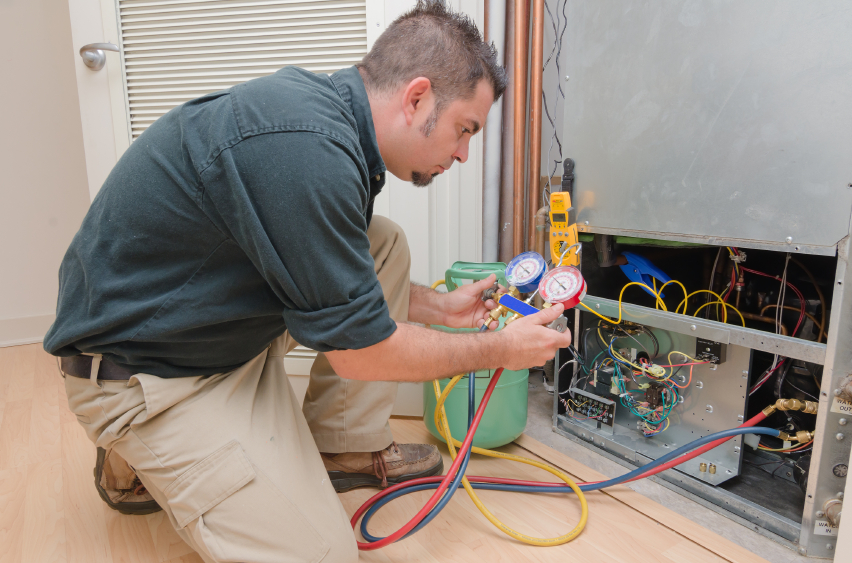Updated December 2025
This is an excellent time to become an HVAC mechanic in Ontario. The latest career outlook report from the Government of Canada Job Bank shows strong demand for HVAC mechanics and technicians across the province.
So, if you're considering becoming an HVAC mechanic, and want to jump in while the trade is hot, what steps should you take?
Here's a look at HVAC training and careers, and our best advice on how to get started.
Step #1. Confirm HVAC is the right trade for you
Your first step is to confirm that HVAC is the right trade for you.
If you don't know people who work in this field, we strongly suggest speaking with an admissions advisor at a trade school. They will give you a good understanding of what an HVAC mechanic does, the training and certification process, and your career options.
Take the time to visit a few schools. Take a tour, speak with the HVAC instructor, and maybe even sit in on an HVAC class. This is a great way to "preview" the learning experience and make sure HVAC is right for you before you invest in training.
Step #2. Complete an HVAC Pre-apprenticeship training program
Once you've confirmed HVAC is the trade you want to pursue, it's time to select a quality pre-apprenticeship HVAC training program.
You'll find programs that can be completed in as little as 12 months. Your courses will include theory and hands-on training in many skill areas, including:
- Refrigeration tools and materials
- Electrical fundamentals, circuits, and controls
- Air conditioning, heat pumps, and controls
- Heating and humidification systems
- Servicing and troubleshooting
- Safe handling of propane and natural gas
- Gas meters, pressure regulators, and relief valves
- Piping and tubing
- Gas appliances
The whole point of pre-apprenticeship HVAC training is to help you learn basic, fundamental HVAC skills so you can get hired as an apprentice.
Why? Because employers don't want to teach you everything from scratch. They want to hire apprentices who already understand HVAC systems, installation methods, safety rules, and troubleshooting techniques.
Having that strong foundation helps you compete better for your first apprenticeship.
Step #3. Get your gas technician certification
HVAC technicians and mechanics often work on gas-fired and propane-fired equipment. In Ontario, you need a gas technician certification to work on this equipment.
So, getting certified is an important step in starting your HVAC career.
A quality HVAC pre-apprenticeship program includes gas technician training. You actually take the exams during the program.
Beginners start with gas technician level 3 and then progress to level 2. At Herzing, our HVAC course includes both level 3 and 2 gas technician training. It's built right in.
Learn more here: Becoming a Certified Gas Technician: 6 Things to Know About the TSSA Exams
Step #4. Complete your HVAC apprenticeship & certification Exam
HVAC is a regulated trade in Ontario. This means you have to complete a certain number of training hours, do an apprenticeship, and pass a certification exam to legally work in this field.
This involves the following:
- 8,280 hours of on-the-job training through an apprenticeship (approximately five years)
- 720 hours of in-school HVAC training
- Passing the certification exam and meeting registration requirements
A good pre-apprenticeship HVAC program will give you a competitive edge and help you land that very first apprenticeship. Then you're on your way to getting certified.
Step #5. Choose your HVAC career path
There are quite a few HVAC career paths open to skilled graduates with Gas 2 certification. HVAC technicians and mechanics are employed by:
- HVAC contractors
- Manufacturers
- Food wholesalers
- Engineering firms
- Retail and servicing establishments
You can work on residential HVAC systems, or find career opportunities in the commercial sector.
Ice rinks, supermarkets, restaurants, and food processing plants are examples of commercial employers for HVAC mechanics. You can also get into HVAC sales.
Want to learn more?
Ready to take the next step and learn more about becoming a licensed HVAC mechanic?
Explore the pre-apprenticeship HVAC program at Herzing College. Learn from licensed instructors and get a solid foundation of HVAC skills to get hired as an apprentice.
Training includes gas technician certification and career support to find an apprenticeship after graduation.
Click below to explore training and chat live with admissions. We're here to help!






